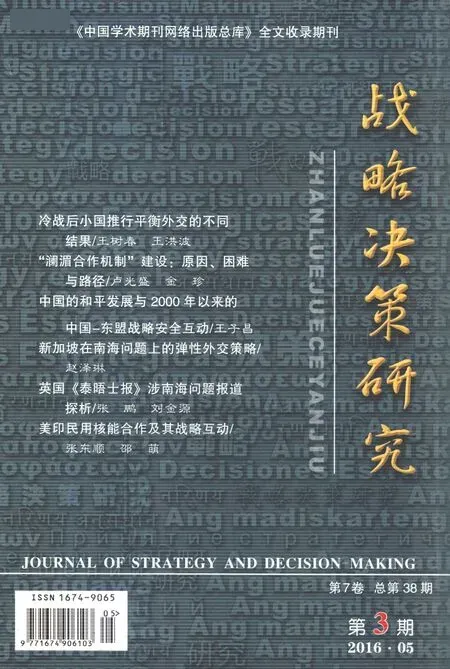Abstract
The Effects of Small States'Balancing Foreign Policy after the Cold War: A Contrastive Analysis of Eurasia and Southeast Asia
Wang Shuchun,Wang Hongbo
Abstract:After the Cold War,the small states in Eurasia and Southeast Asia focused on balancing foreign policy between great powers for security and economic development.However,the outcome of the policy resulted differently.In Southeast Asia,some small states had an economic boom and gained security,while others suffered wars,recessions,fragmentation,or turned to bandwagoning in Eurasia.This essay touches on the various effects of the small states'balancing policy in the geopolitical situation.It suggests four hypotheses consisting of contrastive analysis and correlative study of the small states'foreign policy in Eurasia and Southeast Asia,the balance of great powers and strategic relation, geopolitics,and models of security cooperation.We find that these hypotheses are the same except for the model of security cooperation in the two regions.The model of security cooperation or the alliance security is multilateral in Eurasia, butbilateral in Southeast Asia.Different types of alliance security will determine distinct reactions of great powers.Moreover,these reactions of regional powers will lead to the practical effects of the small states'foreign policy.
small state;balancing foreign policy;Eurasia;Southeast Asia
About the authors:Wang Shuchun,Law School,Guangdong University of Foreign Studies;Wang Hongbo,Law School,Guangdong University of Foreign Studies.
Lantsang-Mekong River Cooperation Initiative:Reason,Difficulty and Path
Lu Guangsheng,Jin Zhen
Abstract:The Lantsang-Mekong River Cooperation Initiative launched on the November 12th,2015,is one of China's major steps in promoting regional cooperation and neighboring diplomacy.In March 2016,China held the First Lantsang-Mekong Cooperation Leaders'Conference,advancing the development ofcooperationmechanisms in an overall manner.The regional cooperation platformis negotiated, constructed and shared by six countries which include China, Vietnam,Cambodia,Laos,Burma.and Thailand.Three major questions exist: how the new Lantsang-Mekong Cooperation(LMC)mechanism can complement and develop in synergy with the existing ones,how to enhance the acceptance and recognition of the LMC mechanism by the countries in the lower reaches,and how China supports the LMC mechanism.In the current situation,China needs to strategically integrate the LMC with the Belt and Road Initiative,and pay special attention to fostering cooperation with Laos,Thailand and Vietnam.China should expand the cooperation in some functional areas and transform sub-regional economic cooperation into political mutual trust and security cooperation.China also needs to further its opening,lower restrictions on food import and allow permission of foreign affairs with the local governments.The country should give priority to LMC stationing and set up the LMC agency in Nanning or Kunming.The establishment of the LMC mechanism will enable China to initiate,lead and make rules.Consequently,China can play a better role in the experiment,by employing the Belt and Road Initiative and neighboring diplomacy,which will contributetotheprosperityandsecurityinthesub-Lantsang-Mekong region.
Key words:Lantsang-Mekong Cooperation Mechanism;the Belt and Road; Greater Mekong subregion economic cooperation;neighboring diplomacy
About the authors:Lu Guangsheng,Institute of International Studies,Yunnan University;Jin Zhen,School of Social Development,Yunnan Normal University.
ASEAN Strategic Security Interaction:China's Peaceful Development Since 2000
Wang Zichang
Abstract:China's peaceful development since 2000 is conducive to the promotion of China-ASEAN strategic security interaction.To show their commitment to peaceful development and to respond to ASEAN's specific requirements,China and ASEAN jointly issued the“Declaration on Conduct of Parties in the South China Sea”,collectively signed China-ASEAN Free Trade Agreement and a seriesof non-traditional security cooperation agreements,and together launched the ASEANRegionalForum(ARF)EastAsiaSummitandothermultilateralcooperation mechanisms.Theproblems of traditional paradigm of strategic security between China and ASEAN indicate that a new paradigm is needed to provide a more consistent and reasonable explanation on China's participation in the ASEAN Strategic Security Interaction.
Key words:strategic security interaction;peaceful development;mode of security
About the author:Wang Zichang; School of International Studies; Jinan University
Singapore's Flexible Foreign Policy on the South China Sea Issue
Zhao Zelin
Abstract:The South China Sea dispute has been an ongoing issue in China and its neighboring countries.The issue has now in fact been internationalized due to American involvement in the area.Nearly all countries in the Southeast Asia are playing their different roles in the dispute.Singapore,being close to U.S.A.,has become a point of interest in geopolitical relations between countries in the South China Sea.Singapore's foreign policy is both pragmatic and flexible.The country always alters its diplomatic strategies according to its needs.Thus, Singaporean foreign policy and its positioning towards the South China Sea dispute are worth taking into consideration.
Key words:the South China Sea dispute;Singapore;foreign policy
About the author:Zhao Zelin,Minzu University of China;Nanyang Technological University,Singapore.
Research on the Reports on South China Sea Issue in British The Times
Zhang Peng,Lin Jinyuan
Abstract:As the South China Sea issue now continues to stir in the Asia-Pacific area,The Times,one of the most influential newspapers in Britain,haspaid more attention to this issue.The current reports in The Times are primarily on the conflicts between the Philippines,Vietnam and China,regarding territorial disputes,and the naval tactics and strategies China has taken.When reporting on the disputes in the South China Sea,The Times has featured more prejudiced materials,clearly showing a political inclination and strong ideological stance.As a result,these reports have affected the public opinion and the government's policy of the country to a certain extent.To diminish the negation of such reports and prevent possible British intervention in the South China Sea issue,it is important for China to utilize mass media to build a positive national image of the country,provide proactively the information pertinent to the issue,and manage disputes through diplomatic and economic means between the two countries.
Key words:Britain;The Times;South China Sea issue;media
About the author:Zhang Peng, Master Student of Collaborative Innovation Center of South China Sea Studies,Nanjing University;Liu Jinyuan,Researcher ofCollaborativeInnovationCenterofSouthChinaSeaStudies,NanjingUniversity.
U.S.-India Civil Nuclear Cooperation and Their Strategic Interaction
Zhang Dongshun,Shao Meng
Abstract:The“U.S.-India Civil Nuclear Cooperation Deal”provides a new opportunity for America and India to further develop their relation.After signing theagreement,thedevelopmentincivilnuclearenergyisslow,whiletherelationship between the two countries is fast.In order to reach their strategic goals,India and the United States need to support each other.Through the U.S.-India Civil Nuclear Cooperation,both countries will be able to make a breakthrough in strategic interaction and cooperation.
Key words:America and India;civil nuclear energy;cooperation;strategy
About the authors:Zhang Dongshun,Shijiazhuang Army Command College of China PLA;Shao Meng,Chinese People's Liberation Army University of International Relations.

